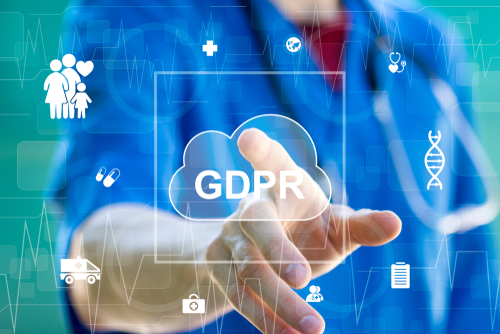The Importance of DPO in the Context of Artificial Intelligence
In the digital age, where personal data circulates at an unprecedented pace, the figure of the Data Protection Officer (DPO) emerges as an essential pillar for navigating the complex landscape of GDPR compliance and data protection. The integration of Artificial Intelligence (AI) into many aspects of our daily and professional lives has significantly increased the complexity and volume of data processed, making the role of the DPO more crucial than ever. This professional, as the guardian of compliance with the General Data Protection Regulation (GDPR), plays a central role in overseeing, implementing, and maintaining data protection standards within organizations using AI.

Why is this topic so crucial?
In today's digital world, the processing of personal data by AI technologies raises complex and unprecedented privacy and security issues. The GDPR, with its strict data protection requirements, imposes new responsibilities on companies, particularly in how they use AI. The DPO, as a data protection expert, plays a key role in navigating these regulatory and technical challenges. Their ability to interpret and apply GDPR principles in the context of AI is essential to ensure not only legal compliance but also to preserve user trust and security.
What You Will Discover
This blog aims to detail the crucial role of the DPO in the context of the use of AI, while ensuring the GDPR complianceWe will explore how the DPO guides organizations through the unique challenges posed by AI, with a focus on implementing data management best practices and minimizing privacy risks. By navigating the various aspects of this complex role, this blog aims to provide an in-depth understanding of the DPO's importance in data protection in the age of AI, offering valuable insights to data protection professionals, technology decision-makers, and digital enthusiasts.
As we explore these themes, we'll cover key concepts such as 'compliance,' 'data protection,' and the impact of AI on GDPR regulations, providing rich, informative, and original content. Join us as we explore the role of the DPO—a role that's becoming increasingly essential in our ever-changing digital world.
1- Foundations of GDPR and Artificial Intelligence
The Foundations of Data Protection
The General Data Protection Regulation (GDPR), which came into force in May 2018, represents a turning point in the way personal data is processed within the European Union and beyond. This regulatory framework is based on key principles aimed at strengthening individuals' control over their personal data, while imposing strict obligations on the organizations that process it. These principles include transparency in data processing, purpose limitation (data should only be collected for specific and legitimate reasons), data minimization (only necessary data should be processed), accuracy, limited storage, integrity and confidentiality, and accountability (organizations must demonstrate their compliance with the GDPR). These principles form the cornerstone of any compliance approach and are central to the work of the Data Protection Officer (DPO).
Technological Revolution and Data Processing
Artificial Intelligence (AI) refers to systems or machines capable of simulating human intelligence. Through complex algorithms and machine learning, AI can process, analyze, and interpret huge volumes of data much faster than traditional human methods. Across many industries, from healthcare to finance to marketing, AI has revolutionized the way data is used for decision-making, trend prediction, and process automation. However, this ability to analyze and process large amounts of personal data poses significant challenges in terms of data protection and privacy.
New Compliance Challenges
The intersection of AI and the GDPR opens up a field of unique questions and challenges. On the one hand, AI can process personal data in ways that create new insights and predictions, often without the explicit consent or full awareness of the individuals involved. On the other hand, the GDPR requires that any use of personal data be transparent, secure, and justifiable. The DPO, in this context, becomes a key player in ensuring that AI applications comply with GDPR principles. This includes ensuring the transparency of algorithms, establishing procedures for the right to explanation (when decisions are made automatically), and managing data protection risks. The DPO must also ensure that AI data processing practices comply with individuals' rights, such as the right to access, rectification, erasure, and data portability.
The emergence of AI presents both opportunities and challenges for data protection. Understanding these foundations and how they interact is crucial for any organization seeking to implement AI ethically and compliantly. In the following sections, we will explore in more detail the role of the DPO in navigating these complex challenges, thereby ensuring data protection in the age of AI.
2- The Vital Role of the DPO in the Era of AI and GDPR Compliance
Key Responsibilities of the DPO
The Data Protection Officer (DPO) plays a crucial role in today's data protection landscape, particularly in environments where Artificial Intelligence (AI) is pervasive. As the focal point for compliance with the General Data Protection Regulation (GDPR), the DPO's primary mission is to oversee the strategy and execution of data protection obligations within an organization. This responsibility includes monitoring data collection, processing, and storage, as well as ensuring that these activities comply with GDPR requirements. The DPO is also responsible for acting as a point of contact between the organization and supervisory authorities, while being a trusted advisor to management and employees on data protection matters.
Intersection of DPO and AI: An Evolving Role
In the context of AI, the role of the DPO becomes even more dynamic and demanding. AI, with its ability to process and analyze massive volumes of data, poses unique challenges in terms of GDPR complianceThe DPO must therefore be actively involved in AI projects from their inception to ensure that the principles of “data protection by design” and “data protection by default” are incorporated. This means working closely with AI development teams to ensure that algorithms and data processing processes respect individuals’ privacy and data protection rights. The DPO must also ensure that AI processing methods are transparent and understandable, and that individuals are informed about how their data is being used.
Managing AI Risks under GDPR
Risk management is another essential facet of the DPO's role in the context of AI. The DPO must assess and identify potential data protection risks inherent in AI technologies. This involves conducting data protection impact assessments (DPIAs) for high-risk AI projects, focusing on aspects such as profiling, automated decisions, and the large-scale processing of special categories of personal data. The DPO plays a key role in recommending and implementing measures to mitigate these risks, such as data anonymization, access controls, and regular security audits.
In summary, the DPO is a key player in ensuring compliance and data protection in the age of AI. Their ability to navigate the complex AI landscape, while ensuring compliance with the strict standards of the GDPR, is essential to ensuring that AI technologies are used ethically and responsibly. The next section of our blog will focus on the specific challenges and opportunities that the DPO faces in this constantly evolving environment.
3- The DPO's Journey in the Era of AI: Between Challenges and Innovations
Navigating the Challenges: The Role of the DPO in the Face of AI
The role of the Data Protection Officer (DPO) in the Artificial Intelligence (AI) environment is fraught with unique challenges. These challenges are primarily due to the complex and evolving nature of AI, coupled with the stringent requirements of the GDPR.
One of the major obstacles for the DPO is the technical complexity of AI systems. These systems can be “black boxes,” making it difficult to understand how data is processed and decisions are made. This opacity runs counter to the GDPR’s transparency principle, requiring DPOs to develop a thorough understanding of AI technologies to effectively assess their compliance.
The rapid evolution of AI technologies presents another challenge. DPOs must stay up-to-date with the latest advancements to anticipate and manage data protection risks. This task is made all the more difficult by the fact that AI is evolving at a much faster pace than regulatory frameworks.
Managing AI risks requires DPOs to not only understand the technical aspects, but also ensure that all data processing operations respect individuals' rights as defined by the GDPR. This requires a proactive and well-informed approach to assessing and mitigating potential risks.
Opportunities for Innovation: GDPR as a Catalyst
While the GDPR presents challenges, it also offers considerable opportunities for innovation in the field of data protection.
The GDPR, with its stringent requirements, is pushing organizations to innovate responsibly. DPOs can play a crucial role in guiding AI teams toward approaches that not only maintain compliance but also strengthen user trust and the company's reputation.
The need for a service of GDPR compliance encourages the creation of innovative solutions for data processing. This may include the development of AI systems that are inherently designed to respect privacy (Privacy by Design), data analysis tools that minimize the risk of data breaches, or transparent and explainable algorithms.
Ultimately, adopting GDPR-compliant data processing practices can strengthen customer and user trust. DPOs have the opportunity to turn GDPR compliance into a competitive advantage by promoting transparency and building trusting relationships based on respect for privacy.
In conclusion, the challenges posed by integrating AI under the GDPR are numerous, but they also come with significant opportunities for innovation and value creation. By skillfully navigating these challenges and opportunities, DPOs can not only ensure compliance but also pave the way for safer, more ethical, and more innovative data processing practices.
4- Concrete Examples: The DPO at Work in the World of AI
Case Studies: AI in Action and the Key Role of the DPO
In the vast world of Artificial Intelligence (AI), the Data Protection Officer (DPO) plays a vital role. Let's examine some real-life cases where AI is used, and how the DPO ensures compliance with the General Data Protection Regulation (GDPR).
Use Case 1
Use Case 2
AI in Health and Data Protection
In the healthcare sector, AI is frequently used to analyze medical records and assist in clinical decision-making. A hospital DPO ensured that AI algorithms processing sensitive health data were GDPR compliant. He implemented protocols for anonymizing data before AI processing, ensuring the protection of patients' personal information while still reaping the benefits of predictive analytics.
AI in Retail and Personalization
A retail company using AI to personalize product recommendations needed to ensure its practices were GDPR compliant. The DPO played a crucial role in assessing the data protection impact of these systems and implementing measures to ensure transparency and informed customer consent.
Best Practices: Excellence in GDPR Compliance
DPOs, when working with AI, must adopt and promote best practices to ensure GDPR compliance.
Best Practice 1
Best Practice 2
Transparency and Explainability of Algorithms
A DPO at a tech company worked with AI teams to develop transparent and explainable algorithms. This not only helped the company meet GDPR transparency requirements, but also increased user trust in the company's products.
Data Protection Impact Assessments (DPIA)
Another best practice is to conduct DPIAs for high-risk AI projects. A DPO in the financial sector oversaw DPIAs for AI systems used in credit assessment, ensuring that risks to individuals' rights and freedoms were properly identified and mitigated.
These case studies and best practices illustrate how, in the complex and evolving world of AI, the DPO plays a vital role in navigating the challenges of GDPR compliance. By taking a proactive and knowledgeable approach, the DPO can help organizations harness the potential of AI while maintaining rigorous data protection standards.
5- GDPR Compliance Strategies for the DPO in the AI Universe
Practical Tips for Effective Compliance
In the dynamic world of Artificial Intelligence (AI), the Data Protection Officer (DPO) must adopt robust strategies to ensure compliance with the General Data Protection Regulation (GDPR). Here are some practical tips to help you achieve this.
- Integrating Data Protection by Design: The DPO must ensure that data protection is integrated into the design of any AI project. This means working closely with developers to ensure that AI systems comply with GDPR principles from their initial development.
- Conduct Data Protection Impact Assessments (DPIA): For AI projects that pose a high risk to individual rights and freedoms, DPOs must conduct DPIAs. These assessments will help identify and mitigate potential data protection risks.
- Continuing Training and Awareness: There GDPR training Continuous awareness is essential to stay up to date with developments in AI and the GDPR. The DPO must ensure constant awareness within the organization, including training teams involved in AI projects on GDPR requirements.
Tools and Resources for the DPO
To assist DPOs in their GDPR compliance mission in AI projects, various tools and resources can be used.
- Compliance Management Software: THE GDPR compliance platforms can greatly assist DPOs. These tools offer features such as DPIA management, data subject access request tracking, and data breach reporting.
- Online Resources and Training: DPOs can rely on a variety of online resources, including official GDPR guides, webinars, online courses, and expert articles. These resources help keep up-to-date with the latest trends and best practices in GDPR compliance in the context of AI.
- Professional Networks and Discussion Groups: Participating in professional networks and discussion groups dedicated to GDPR and AI is an excellent way for DPOs to exchange knowledge, experiences, and solutions to common challenges.
By adopting these strategies and using these tools, DPOs can effectively guide their organizations toward GDPR compliance in the area of AI. These practices and resources will enable them to meet the challenges inherent in data protection in an ever-changing technological environment.
6- The Future of Data Protection: DPO and AI in a Changing World
Future Trends in AI and Data Protection
The Artificial Intelligence (AI) and data protection landscape is constantly evolving, marked by rapid technological advancements and regulatory changes.
An emerging trend is the development of more transparent and explainable AI. As the demand for understandable algorithms increases, DPOs will need to ensure that these systems meet the GDPR's transparency and explainability requirements.
Data protection regulations are likely to tighten in response to the growing use of AI. DPOs will need to be vigilant about legislative and regulatory changes, adapting quickly to maintain compliance.
The increased use of AI in cybersecurity presents both opportunities and challenges for DPOs. While AI can help detect and prevent data breaches, it can also create new data protection risks.
The Evolution of the DPO Role in the Age of AI
The role of the Data Protection Officer (DPO) is becoming even more strategic and central in organizations integrating AI into their operations.
Technical and Regulatory Expertise: As AI advances, DPOs will need to develop a deeper technical understanding of AI systems to effectively assess their GDPR compliance. This expertise will need to extend to the regulatory and ethical aspects of AI.
Cross-functional Collaboration: DPOs will play a key role in facilitating collaboration between IT, legal, and compliance departments. This cross-functional collaboration will be essential to ensuring a consistent and comprehensive approach to compliance and risk management.
Influence on AI Development: Finally, DPOs could have a growing influence on the development and implementation of AI within organizations. They will not only ensure compliance but also play an active role in the ethical design of AI systems, ensuring that data protection is integrated from the outset.
The future holds both challenges and exciting opportunities for DPOs. Their role will become even more vital as AI continues to transform the data landscape. By staying informed and proactive, DPOs will be well positioned to guide their organizations through these changes, ensuring compliance and data protection in a rapidly evolving digital world.
Conclusion: Towards a New Era of Compliance and Innovation
By exploring the crucial role of the Data Protection Officer (DPO) in the context of Artificial Intelligence (AI) and GDPR, we discovered the importance of compliance and data protection in an ever-changing digital world. DPOs are at the forefront of this transformation, skillfully navigating regulatory challenges and technological opportunities.
We now invite you to take the step towards optimal management of GDPR compliance with our platform Viqtor dedicated. Designed to support DPOs in their critical mission, our solution offers intuitive tools and comprehensive resources to master the complexities of AI and GDPR.
Join us on this adventure towards a GDPR compliance simplified and enhanced data protection. Find out how our GDPR compliance platform Viqtor can transform your approach to GDPR compliance and propel your organization toward data protection excellence. Visit us now to learn more and begin your journey to seamless GDPR compliance.







